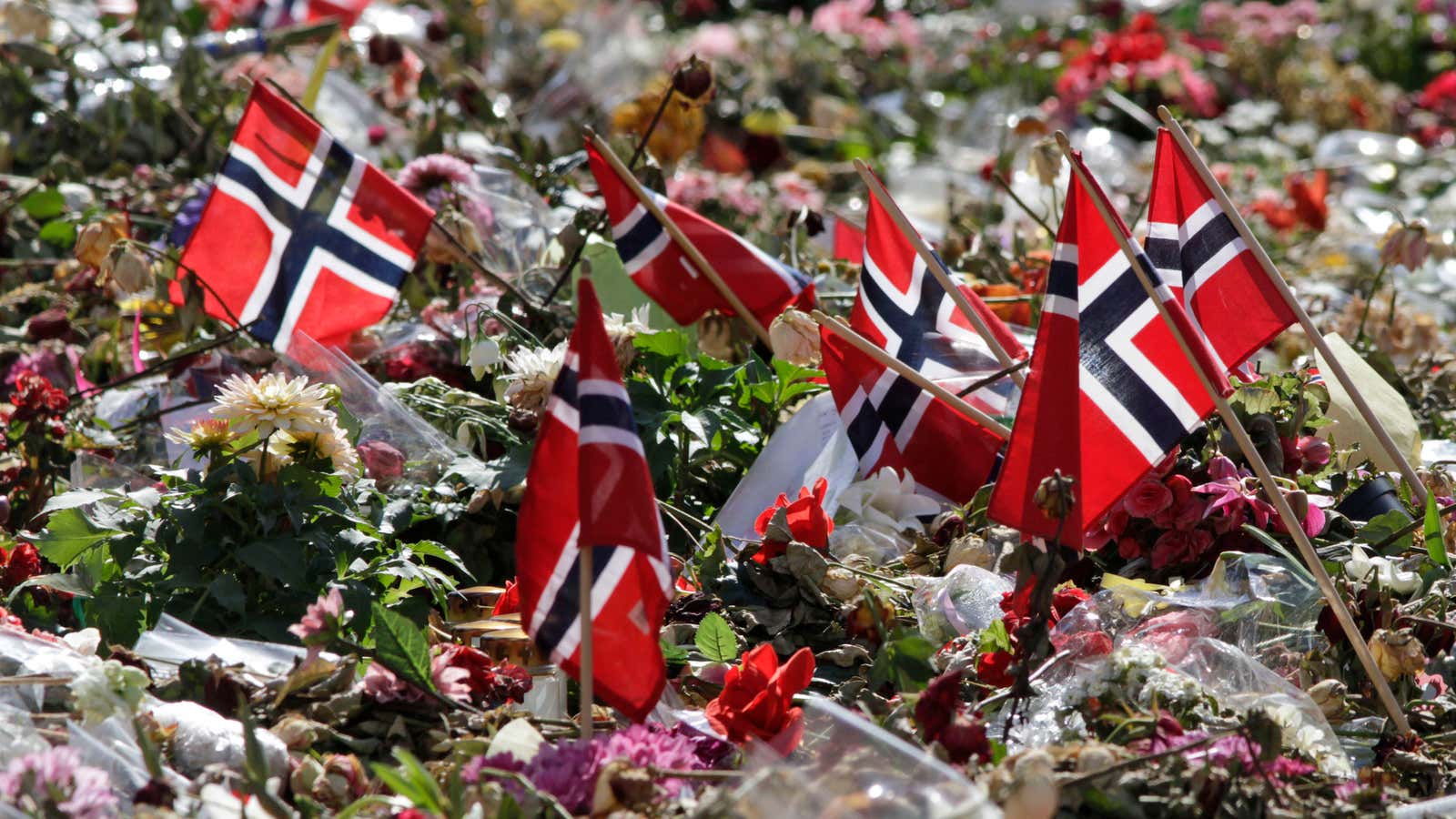In 2011, Norwegian terrorist Anders Behring Breivik killed 77 people, many of them teenagers, in a day-long rampage that began with a car bomb at the government headquarters in Oslo and ended with a shooting spree at a summer camp on Utøya Island. Many people might argue that the perpetrator of such terrible act of violence deserves the harshest possible punishment. But on Apr. 20, a Norwegian court ruled that Breivik’s treatment in state prison, which includes solitary confinement, has violated his human rights.
I was on Utøya Island on the day of Breivik’s attack, attending the summer camp along with other members of the Labour Youth Party. As a survivor who is committed to combatting the rise of violent extremism, I believe that the court made the right decision. The ruling shows that Norwegian society is capable of standing by its humanist principles even in the face of terrorism.
The recent case is, in many ways, far more complicated than the trial against Breivik in 2012. During the earlier trial, he received Norway’s maximum sentence of 21 years in prison for his crimes, with a potential life-long extension if he failed to be rehabilitated. That case was fairly straightforward: it was clear that Breivik had committed the crimes, and that he should be punished for taking the lives of so many.
But the tables turned with Breivik’s lawsuit against Norway. Now it was our society that had to stand trial. Could we see even our worst terrorist as a fellow human being, worthy of the basic human rights and equality afforded to all people in the eyes of the law?
Over the last few years, many have attempted to dehumanize Breivik. He’s often referred to as a “monster” rather than a man. Various protests have attempted to remove his picture from the public sphere. Some Norwegians refuse to speak his name, referring to him instead as “he who shall not be named”—the same phrase applied to Harry Potter villain Lord Voldemort, a moniker that ironically seems to elevate him above ordinary humans. Some have suggested that he deserves to be killed, although the death penalty is banned in our country.
These perspectives may not seem extreme to some international readers. But such attitudes are rare in Norway. Our nation’s judicial system is based on the rehabilitation and reintegration of prisoners into larger society—an approach that has given us a remarkably low rate of recidivism. Only about 20% of Norwegian prisoners, compared to 76% of American prisoners, return to jail within five years of being released. Norway also boasts very low crime rates compared to the US and many other other Western European countries—a fact that debunks the theory that harsher sentences and capital punishment will deter people from breaking the law.
On Utøya Island, Breivik dehumanized us. He saw himself as superior to us, and valued his life and beliefs over ours. This allowed him to rationalize killing children as young as 14. I will not follow in his path in dehumanizing him or anyone else. Instead, I will stand up for our shared humanity and defend it. Breivik does not get to change the way that I, and my nation, treat our fellow human beings—including Breivik himself.
Dehumanization is a central to all forms of extremism. We see it in the narratives that support genocides, as well as among extremist groups such as the Islamic State, the Ku Klux Klan and other far-right, extremist groups. The Nazis referred to Jews as rats; the Rwandan radio incited Hutus to violence by referring to Tutsis as cockroaches. We see the continued pernicious effects of dehumanization in the language used by some to refer to migrants, immigrants, muslims, Mexicans and minorities.
For the last few years, I’ve devoted myself to working against violent extremism. I’m currently working on a master’s thesis about how we can dissuade extremists from believing in violence as a tool for obtaining political goals. My research has led me to collaborate closely with reformed violent extremists. They know better than anyone the paths that lead people into, and out of, violent extremism.
These collaborations have taught me that a society’s most important weapon in fighting extremism—and thus terrorism—is to consistently demonstrate its commitment to fair and just treatment of all people. Our treatment of the people who are least powerful in our communities, including prisoners, is the best way we can demonstrate how wrong it is to treat any human as less worthy than others. When we include those who feel marginalized and show them that they belong, refusing to distinguish between “us” and “them,” we combat the anger and isolation that fosters extremism.
That Norwegian courts managed to come to an apparently well-reasoned verdict in favor of our most notorious terrorist is proof of the strength of our legal system. The verdict shows that we are capable of staying true to our values even in extreme circumstances. Now it’s time for our prison system to take the verdict to heart, rectify its failures and start treating Breivik, and all other prisoners, with respect for their human rights.
Throughout the world, we’ve seen terrorism push governments toward violence, oppression, and surveillance while casting off their principles of liberty, equality and privacy. It’s time for the international community to break this pattern. We should never approach terrorism with naïveté. But we must challenge those who seek to strip others of their humanity by asserting that all lives have equal value.
